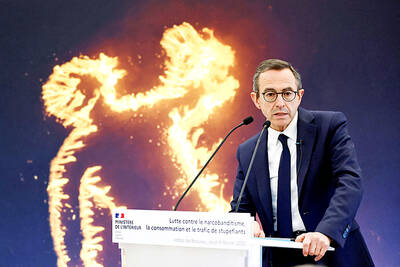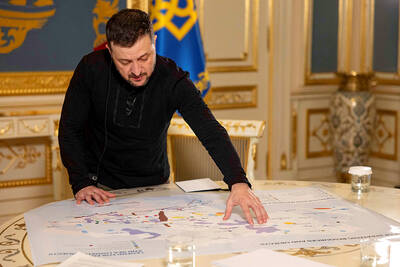A sweeping government audit has revealed that up to 50,000 pieces are missing from Russia’s museums — everything from pre-Revolutionary medals and weapons to precious works of art — a member of the survey team said on Thursday.
Former Russian president Vladimir Putin ordered the survey after his government was deeply embarrassed in 2006 by hundreds of thefts from the crown jewel of Russia’s art world, St Petersburg’s Hermitage gallery.
More than 1,600 museums have been inspected since then and most of them have items missing, said Ilya Ryasnoi of Russia’s interior ministry.
The lost items were worth a total of “several million dollars,” he said, adding most of the disappeared inventory was pre-Revolutionary and Soviet-era medals, weapons and clothes.
Precious works of art were among the missing items but separate investigations were being conducted for those, Ryasnoi said.
“Yes, there have been thefts. Museum staff have used their contacts to steal some of the artifacts without a trace,” he said. “But most has simply been lost during transportation.”
Citing specific cases, Ryasnoi said 88 World War II medals had vanished from a museum in the Altai region, and weaponry had disappeared from a museum in the Siberian city of Novokuznetsk.
Almost 300 artifacts were missing from the Russian Museum of Ethnography in St Petersburg, he said.
So far authorities have opened 15 criminal cases of large-scale theft, which carries a maximum prison sentence of seven years, Ryasnoi said. More than 100 museum employees — including security guards and storage workers — have been charged with minor infractions.
However, Ryasnoi said the majority of the missing items had been mislaid or stolen during Soviet times, meaning many of those responsible may not face prosecution due to statutes of limitation.
The commission is to present its findings early next year. In the meantime it will continue auditing more 400 museums, including the State Historical Museum on Moscow’s Red Square, he said.
The commission, headed by Russian Deputy Prime Minister Alexander Zhukov, has a mandate to check around 80 million items in total, a difficult task given the state of Russian museum catalogues.
“Only two million of the artifacts are even photographed,” Ryasnoi said.
Furthermore, most Russian museums do not have computerized records, he said. Some items have handwritten descriptions logged in Soviet-era log books, but most just carry a single-line description, he said, making tracking them all but impossible.
Ryasnoi’s remarks came the same day that Russian President Dmitry Medvedev visited an art museum in Petrozavodsk, in northwestern Russia, which had recently computerized its inventory.

RIGHTS FEARS: A protester said Beijing would use the embassy to catch and send Hong Kongers to China, while a lawmaker said Chinese agents had threatened Britons Hundreds of demonstrators on Saturday protested at a site earmarked for Beijing’s controversial new embassy in London over human rights and security concerns. The new embassy — if approved by the British government — would be the “biggest Chinese embassy in Europe,” one lawmaker said earlier. Protester Iona Boswell, a 40-year-old social worker, said there was “no need for a mega embassy here” and that she believed it would be used to facilitate the “harassment of dissidents.” China has for several years been trying to relocate its embassy, currently in the British capital’s upmarket Marylebone district, to the sprawling historic site in the

A deluge of disinformation about a virus called hMPV is stoking anti-China sentiment across Asia and spurring unfounded concerns of renewed lockdowns, despite experts dismissing comparisons with the COVID-19 pandemic five years ago. Agence France-Presse’s fact-checkers have debunked a slew of social media posts about the usually non-fatal respiratory disease human metapneumovirus after cases rose in China. Many of these posts claimed that people were dying and that a national emergency had been declared. Garnering tens of thousands of views, some posts recycled old footage from China’s draconian lockdowns during the COVID-19 pandemic, which originated in the country in late

French police on Monday arrested a man in his 20s on suspicion of murder after an 11-year-old girl was found dead in a wood south of Paris over the weekend in a killing that sparked shock and a massive search for clues. The girl, named as Louise, was found stabbed to death in the Essonne region south of Paris in the night of Friday to Saturday, police said. She had been missing since leaving school on Friday afternoon and was found just a few hundred meters from her school. A police source, who asked not to be named, said that she had been

BACK TO BATTLE: North Korean soldiers have returned to the front lines in Russia’s Kursk region after earlier reports that Moscow had withdrawn them following heavy losses Ukrainian President Volodymyr Zelenskiy on Friday pored over a once-classified map of vast deposits of rare earths and other critical minerals as part of a push to appeal to US President Donald Trump’s penchant for a deal. The US president, whose administration is pressing for a rapid end to Ukraine’s war with Russia, on Monday said he wanted Ukraine to supply the US with rare earths and other minerals in return for financially supporting its war effort. “If we are talking about a deal, then let’s do a deal, we are only for it,” Zelenskiy said, emphasizing Ukraine’s need for security guarantees